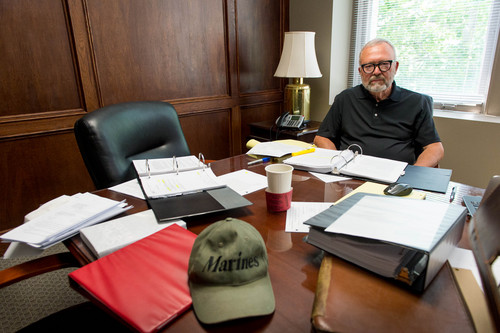This is an archived article that was published on sltrib.com in 2014, and information in the article may be outdated. It is provided only for personal research purposes and may not be reprinted.
A Salt Lake City lawyer suing the federal government for records in the Oklahoma City bombing case alleged Thursday that an FBI agent threatened one of his witnesses to keep him from testifying at trial.
Attorney Jesse Trentadue said the Salt Lake City-based FBI agent had contacted John Matthews, who he described as a former undercover operative for the government, and suggested that it would be "best for everyone if [Matthews] didn't show up to testify."
The agent also suggested that Matthews take a vacation and said that if he did testify, "he should have a case of the 'I-don't-remembers,' " Trentadue told U.S. District Judge Clark Waddoups.
Lawyers for the FBI denied the claim and said Matthews had called the agency asking how he could get out of testifying. The agent told Matthews that he should obey a valid subpoena, Department of Justice attorney Kathryn Wyer said.
But Trentadue countered that Matthews was testifying voluntarily and had been contacted repeatedly by the FBI. He said Matthews was going to testify about PATCON, an operation that targeted the militia movement in the 1990s.
Trentadue on Tuesday first informed Waddoups that he had learned Matthews was backing out of testifying after talking to government officials, and the judge had told the DOJ attorneys to look into the matter. After hearing further details about the claim on Thursday, Waddoups scheduled a hearing next month on the matter.
The allegation was raised on the last day of a four-day trial on Trentadue's lawsuit, which claims the FBI failed to do an adequate search for bombing videotapes and documents that he requested under the federal Freedom of Information Act (FOIA). Waddoups has taken the case under consideration and will issue a ruling later.
Among the records that Trentadue is seeking is footage he believes shows two men exiting a Ryder truck parked in front of the Alfred P. Murrah Federal Building and the detonation of explosives in the vehicle.
In addition, he wants surveillance tapes taken on the morning of the explosion from cameras in downtown locations and the original dashboard camera videotape of Oklahoma Highway Patrol Trooper Charlie Hanger arresting bomber Timothy McVeigh. The arrest tape he received was edited and does not show McVeigh, Trentadue says.
Trentadue is asking for an order allowing him to search for tapes and documents at FBI locations, including field offices in Oklahoma City and Los Angeles, and requiring the bureau to produce the records he requested.
The FBI says it spent weeks searching its massive bombing investigation archive and that it has no tape of the explosion or the other requested materials.
Trentadue believes the records will provide information about his brother's death in a federal prison in Oklahoma City a few months after the April 19, 1995, bombing that killed 168 people. The death of Kenneth Trentadue was ruled a suicide but his family believes he was mistaken for a bombing conspirator and killed in an interrogation that got out of hand. Federal officials deny the allegation.
To support his claim that the requested records exist, Trentadue has submitted government documents and news reports that refer to tapes or photographs. They include an FBI report that a source said an attorney purporting to represent an FBI agent had tried to sell a tape that shows a Ryder truck pulling up at the Murrah Building and two men, one of whom resembles McVeigh, getting out of the vehicle.
Also among the documentation submitted by Trentadue is another FBI report that says a camera inside the Regency Tower Apartments a block from the Murrah Building had picked up images of a Ryder truck at about 5:57 a.m. the day of the bombing and again at 8:57 a.m., a few minutes before the blast. Trentadue has a copy of the later video but it does not show the truck's driver, he said.
On Thursday, Stephen Brannan, a retired FBI agent, testified he had investigated the tape sale report and determined it was a hoax. He said "that video did not exist."
In other testimony Thursday:
• Three other former FBI agents said they had reviewed tapes gathered from locations around the Murrah Building and none showed the detonation.
• Richard E. Williams, a former Murrah Building manager, said surveillance cameras there had been phased out several years before the bombing. The cameras had been left up as a deterrent, he said.
• Hanger, now Noble County, Okla., sheriff, said he did not turn on his dashboard camera until after he arrested McVeigh because he didn't feel it was necessary for a simple traffic stop.
pmanson@sltrib.com Twitter: PamelaMansonSLC



